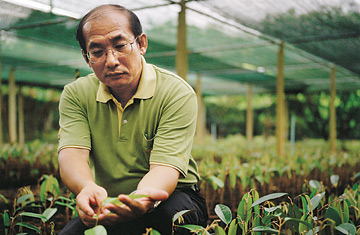
Portrait of Dr. Songpol Somsri in the nursery for Durian trees.
The ripe durian's scent has been likened to moldy cheese, dead cats and stale vomit. Hotels, airlines and subways routinely ban the green, spiky fruit. To dedicate your life's work to Asia's "king of fruit," then, takes true love.
Horticulturist Songpol Somsri, 52, may know more about the durian than anyone else in the world. He grew up on a durian farm in Thailand's Chantaburi district, about 250 miles (400 km) east of Bangkok. Since 1977, the government scientist has been on a mission to popularize the fruit around the world. His first step? Eliminate the odor.
Beneath its thorny exterior, a durian is temptingly sweet. But most people catch one whiff and run the other way. Songpol has cross-pollinated more than 90 different varieties over the past two decades, sometimes tasting as many as 1,000 durians a year. The result is Chantaburi No. 1, the first odorless durian. "The flesh is creamy and tender," Songpol says. "And the smell is as inoffensive as a banana's."
Only one Chantaburi No. 1 tree exists today, bearing just a dozen or so fruit each year. The Thai government hopes the fruit will be sold commercially worldwide within the next five years. But will shoppers buy it? Many durian loversand in Southeast Asia there are millions — argue that if a durian doesn't have a smell, it isn't really a durian. "Doesn't he have something better to do?" a Singapore-based food columnist recently wrote.
Songpol laughs off such talk. "Only old people like the smell," he says. Still, to appease critics, he has come up with Chantaburi No. 3. This version is also fragrance-free, but only until three days after it ripens. "Perfect for transport," Songpol says.